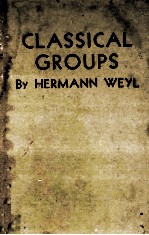

The Classical Groups Their Invariants and RepresentationsPDF电子书下载
- 电子书积分:12 积分如何计算积分?
- 作 者:Hermann Weyl
- 出 版 社:Princeton University Press
- 出版年份:1939
- ISBN:
- 页数:320 页
CHAPTER Ⅰ INTRODUCTION 1
1.Fields,rings,ideals,polynomials 1
2.Vector space 6
3.Orthogonal transformations,Euclidean vector geometry 11
4.Groups,Klein's Erlanger program.Quantities 13
5.Invariants and covariants 23
CHAPTER Ⅱ VECTOR INVARIANTS 27
1.Remembrance of things past 27
2.The main propositions of the theory of invariants 29
A.FIRST MAIN THEOREM 36
3.First example:the symmetric group 36
4.Capelli's identity 39
5.Reduction of the first main problem by means of Capelli's identities 42
6.Second example:the unimodular group SL(n) 45
7.Extension theorem.Third example:the group of step transformations 47
8.A general method for including contravariant arguments 49
9.Fourth example:the orthogonal group 52
B.A CLOSE-UP OF THE ORTHOGONAL GROUP 56
10.Cayley's rational parametrization of the orthogonal group 56
11.Formal orthogonal invariants 62
12.Arbitrary metric ground form 65
13.The infinitesimal standpoint 66
C.THE SECOND MAIN THEOREM 70
14.Statement of the proposition for the unimodular group 70
15.Capelli's formal congruence 72
16.Proof of the second main theorem for the unimodular group 73
17.The second main theorem for the unimodular group 75
CHAPTER Ⅲ MATRIC ALGEBRAS AND GROUP RINGS 79
A.THEORY OF FULLY REDUCIBLE MATRIC ALGEBRAS 79
1.Fundamental notions concerning matric algebras.The Schur lemma 79
2.Preliminaries 84
3.Representations of a simple algebra 87
4.Wedderburn'8 theorem 90
5.The fully reducible matric algebra and its commutator algebra 93
B.THE RING OF A FINITE GROUP AND ITS COMMUTATOR ALGEBRA 96
6.Stating the problem 96
7.Full reducibility of the group ring 101
8.Formal lemmas 106
9.Reciprocity between group ring and commutator algebra 107
10.A generalization 112
CHAPTER Ⅳ THE SYMMETRIC GROUP AND THE FULL LINEAR GROUP 115
1.Representation of a finite group in an algebraically closed field 115
2.The Young symmetrizers.A combinatorial lemma 119
3.The irreducible representations of the symmetric group 124
4.Decomposition of tensor space 127
5.Quantities.Expansion 131
CHAPTER Ⅴ THE ORTHOGONAL GROUP 137
A.THE ENVELOPING ALGEBRA AND THE ORTHOGONAL IDEAL 137
1.Vector invariants of the unimodular group again 137
2.The enveloping algebra of the orthogonal group 140
3.Giving the result its formal setting 143
4.The orthogonal prime ideal 144
5.An abstract algebra related to the orthogonal group 147
B.THE IRREDUCIBLE REPRESENTATIONS 149
6.Decomposition by the trace operation 149
7.The irreducible representations of the full orthogonal group 153
C.THE PROPER ORTHOGONAL GROUP 159
8.Clifford's theorem 159
9.Representations of the proper orthogonal group 163
CHAPTER Ⅵ THE 8YMPLECTIC GROUP 165
1.Vector invariants of the symplectic group 165
2.Parametrization and unitary restriction 169
3.Embedding algebra and representations of the symplectic group 173
CHAPTER Ⅶ CHARACTERS 176
1.Preliminaries about unitary transformations 176
2.Character for symmetrization or alternation alone 181
3.Averaging over a group 185
4.The volume element of the unitary group 194
5.Computation of the characters 198
6.The characters of GL(n).Enumeration of covariants 201
7.A purely algebraic approach 208
8.Characters of the symplectic group 216
9.Characters of the orthogonal group 222
10.Decomposition and X-multiplication 229
11.The Poincaré polynomial 232
CHAPTER Ⅷ GENERAL THEORY OF INVARIANTS 239
A.ALGEBRAIC PART 239
1.Classic invariants and invariants of qualities.Gram's theorem 239
2.The symbolic method 243
3.The binary quadratic 246
4.Irrational methods 248
5.Side remarks 250
6.Hilbert's theorem on polynomial ideals 251
7.Proof of the first main theorem for GL(n) 252
8.The adjunction argument 254
B.DIFFERENTIAL AND INTEGRAL METHODS 258
9.Group germ and Lie algebras 258
10.Differential equations for invariants.Absolute and relative invariants 262
11.The unitarian trick 265
12.The connectivity of the classical groups 268
13.Spinors 270
14.Finite integrity basis for invariants of compact groups 274
15.The first main theorem for finite groups 275
16.Invariant differentials and Betti numbers of a compact Lie group 276
CHAPTER Ⅸ MATRIC ALGEBRAS RESUMED 280
1.Automorphisms 280
2.A lemma on multiplication 283
3.Products of simple algebras 286
4.Adjunction 288
CHAPTER Ⅹ SUPPLEMENTS 291
A.SUPPLEMENT TO CHAPTER II,9-13,AND CHAPTER VI,1,CONCERNING INFINITESIMAL VECTOR INVARIANTS 291
1.An identity for infinitesimal orthogonal invariants 291
2.First Main Theorem for the orthogonal group 293
3.The same for the symplectic group 294
B.SUPPLEMENT TO CHAPTER V,3,AND CHAPTER VI,2 AND 3,CONCERNING THE SYMPLECTIC AND ORTHOGONAL IDEALS 295
4.A proposition on full reduction 295
5.The symplectic ideal 296
6.The full and the proper orthogonal? ideals 299
C.SUPPLEMENT TO CHAPTER VIII,7-8,CONCERNING. 300
7.A modified proof of the main theorem on invariants 300
D.SUPPLEMENT TO CHAPTER IX,4,ABOUT EXTENSION OF THE GROUND FIELD 303
8.Effect of field extension on a division algebra 303
ERRATA AND ADDENDA 307
BIBLIOGRAPHY 308
SUPPLEMENTARY BIBLIOGRAPHY,MAINLY FOR THE YEARS 1940-1945 314
INDEX 317
- 《第一笔零花钱 小钱大妙用 彩印》Hermann,Hesse经济漫画编写组编 2012
- 《流浪者之歌》赫塞(Hermann Hesse)著;高子涵译 2003
- 《实用血液病学》(德)汉佩尔(Heimpel,Hermann)主编;唐锦治等译 1993
- 《人类交换规律与人类行为准则的发展》(德)赫尔曼·海因里希·戈森(Hermann Heinrich Gossen)著;陈秀山译 1997
- 《心理诊断法》(德)赫尔曼·罗夏(Hermann Rorschach)著;袁军译 1997
- 《全脑革命》(美)奈德·赫曼(Ned Hermann)著;宋伟航译 1998
- 《降魔记 小心广告陷阱》(韩)Hermann Hesse经济漫画编写组著 2012
- 《时空穿越 了不起的中国商人》(韩)Hermann Hesse经济漫画编写组著 2012
- 《外星人来了 物价上涨的原因》(韩)Hermann Hesse经济漫画编写组著 2012
- 《莫扎特A大调钢琴协奏曲 钢琴与管弦乐队 No.23 KV488》(奥)莫扎特(Wolfgang Amadeus Mozart)曲) 赫尔曼·贝克(Hermann Beck)钢琴缩谱 2003
- 《中国“80后”大学教师胜任力评价研究=RESEARCH ON THE EVALUATION OF CHINA'S POST 80s GENERATION UNIVERSITY TEACHERS' CO》黄艳著 2013
- 《解读好莱坞:电影的空间与意义》Deborah Thomas著;李达义,曹玉玲译 2004
- 《会说话的星图 星座篇》徐历涛著 2014
- 《可靠性工程与风险管理 第3辑 英文版》赵衍刚编 2012
- 《竞争战略 全译珍藏版》(美)迈克尔·波特(Michael E. Porter)著 2012
- 《中国材料名师讲坛 第1辑》谢建新主编 2012
- 《翻译能力的培养》舍夫娜,阿达巴编 2012
- 《大学生外语口语焦虑 自我图式的视角 for university students: in the view of self-schema》巫文胜著 2014
- 《都柏林大学的教育内涵与实践 探索世界高水平大学发展之路 explore the development of the world high-level university》李全宏编著 2013
- 《物理学 卷1 力学和热学 医学、生物等专业适用 英文改编版原书第4版》AlanGiambattista,BettyMcCarthyRichardson著 2013
